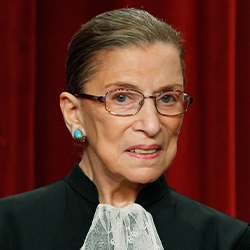
Ruth Bader Ginsburg (1933-2020)
Born in Brooklyn, New York, Ruth Bader Ginsburg became a renowned attorney and law professor at a time when it was rare for women to attend law school. She co-founded the Women’s Rights Project at the American Civil Liberties Union (ACLU) in 1970, and argued six gender discrimination cases before the Supreme Court between 1973 and 1976, winning five. She was appointed to the Supreme Court in 1993 by President Clinton, becoming only the second woman and the first Jewish woman justice. Known for her fiery dissents Justice Ginsburg became a pop culture icon known as the “Notorious RBG” and a role model for countless women and girls.
After her death of cancer on the eve of Rosh Hashana in 2020, Ginsburg became the first woman and the first Jew to lie in state in the United States Capitol. At a memorial ceremony in her honor, Rabbi Lauren Holtzblatt said, “As a lawyer she won equality for women and men, not in one swift victory, but brick by brick, case by case.” The dissents Ginsburg made became so famous for they “were not cries of defeat,” Holtzblatt said. “They were blueprints for the future.”
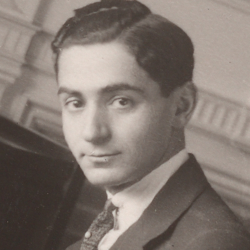
Irving Berlin (1888-1989)
Born in Siberia, then-Israel Beilin fled with his family to America as a young boy in 1893 to escape the Russian persecution of Jews. Changing his name to Irving Berlin due to the rampant antisemitism in the entertainment industry, he became known for writing music and lyrics in the American vernacular: uncomplicated, simple, and direct, with his stated aim being to “reach the heart of the average American,” whom he saw as the “real soul of the country.”
Berlin wrote hundreds of songs, many becoming major hits, which made him famous before he turned thirty. During his 60-year career he wrote an estimated 1,500 songs, including the scores for 20 original Broadway shows and 15 original Hollywood films. His songs were nominated eight times for Academy Awards.
When Berlin received the Congressional Gold Medal from President Dwight D. Eisenhower for composing “God Bless America,” he said, “‘God Bless America’ was not just a song but an expression of my feeling toward the country to which I owe what I have and what I am.”
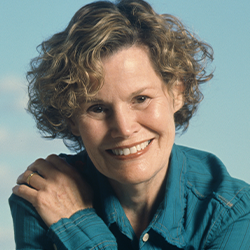
Judy Blume (1938-)
Born in Elizabeth, New Jersey into a culturally Jewish family, Blume is a beloved author of children’s and young adult literature that tackled difficult topics like divorce, puberty, death, body image, bullying, and sexuality with openness and honesty and without judgment. She began writing in her early twenties while her young children were in preschool and still writes today.
The winner of countless awards for children’s literature, Blume is the subject of a 2022 documentary, “Judy Blume Forever.” A movie adaptation of one of her most famous books, Are You There God? It’s Me, Margaret, is in theaters now!
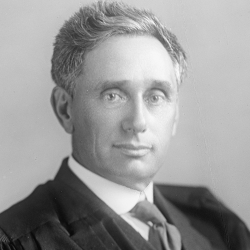
Louis Brandeis (1856-1941)
Born to Jewish immigrant parents in Louisville, Kentucky, Louis Brandeis graduated Harvard Law School at the age of 20 with the highest grade point average in the school’s history. During his years in the private practice of law in Boston, he became known as the “people’s attorney” for his noted pro bono work in the public interest. He supported workers’ rights, championing fair wages and working hours. He was instrumental in creating the legal concept of a “right to privacy” by writing an article on the topic for the Harvard Law Review in 1890.
In the 1910s, Brandeis became a leader in the nascent American Zionist movement. He strongly believed that a Jewish homeland was the only solution to the virulent antisemitism that plagued Jews in Europe, and he famously argued that being a Zionist did not contradict with being a loyal American citizen.
In 1916, Brandeis became the first Jew to be nominated to the Supreme Court. During his tenure on the court, he was instrumental in shaping modern American jurisprudence. His principles and ideas on the law, democracy, and society are as relevant and useful today as they were in the first half of the 20th century — a time when individual liberties for average citizens often collided with growing governmental and corporate power.
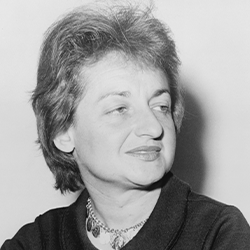
Betty Friedan (1921-2006)
Born in Peoria, Illinois, Friedan was an American feminist writer and activist. A leading figure in the women’s movement in the United States, her 1963 book The Feminine Mystique is credited with sparking the second wave of American feminism.
Friedan co-founded and was the first president of the National Organization for Women (NOW), which aimed to bring women “into the mainstream of American society now [in] fully equal partnership with men.” She organized the nationwide Women’s Strike for Equality, which was successful beyond expectations, broadening the feminist movement. Friedan joined other leading feminists to establish the National Women’s Political Caucus, and was a strong supporter of the proposed Equal Rights Amendment to the United States Constitution.
Although agnostic, Friedan’s Jewish heritage informed her fight for women’s rights. She once said that her “passion against injustice ... originated from [her] feelings of the injustice of anti-Semitism.”
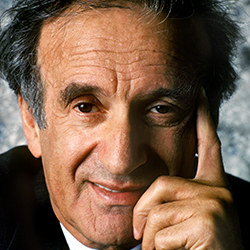
Elie Wiesel (1928-2016)
Born in Romania, Elie Wiesel survived the Holocaust to become a world-renowned writer, professor, human rights activist, and Nobel laureate. Wiesel spent his teenage years imprisoned in concentration camps as a victim of the German Nazi regime. Becoming a journalist and author after the war, he moved to New York as a foreign correspondent in 1956. He authored 57 books, including Night, a work based on his experiences in the Auschwitz and Buchenwald concentration camps.
Wiesel was a humanities professor at Boston University, which created the Elie Wiesel Center for Jewish Studies in his honor. He was involved with Jewish and human rights causes throughout his adult life and helped establish the United States Holocaust Memorial Museum in Washington, D.C.
Wiesel was awarded the Nobel Peace Prize in 1986. At the award ceremony, the Nobel Committee called him a “messenger to mankind.” In his acceptance speech, Wiesel famously stated, “Silence encourages the tormentor, never the tormented. Sometimes we must interfere.”
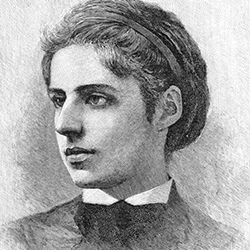
Emma Lazarus (1849-1887)
Born in New York, Emma Lazarus was an American author of poetry, prose, and translations, as well as an activist for Jewish causes.
Of Sephardi Jewish descent, her ancestors were originally from Portugal and they were among the original twenty-three Portuguese Jews who arrived in New Amsterdam after they had fled from their settlement in Recife, Brazil to escape the Inquisition.
Lazarus used her poems and essays to speak out against the persecution of Jews in Europe and growing antisemitism in the United States. She publicly proclaimed her identity as a Jewish poet and advocated for Jewish issues internationally.
Lazarus is most famous for her poem, “The New Colossus,” that is engraved at the base of the Statue of Liberty. Her words “Give me your tired, your poor, your huddled masses yearning to breathe free,” are almost as well-known as the Statue itself.
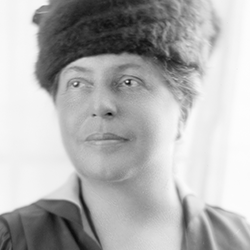
Lillian Wald (1867-1940)
Born in Cincinnati, Ohio, Wald was an American nurse, humanitarian and author. She was known for contributions to human rights and was the founder of American community nursing.
Lillian Wald founded the Henry Street Settlement in New York City and was an early advocate to have nurses in public schools. She helped to bring health care to the residents of New York’s Lower East Side and fought for public health care, women’s rights, and children’s rights while running the Henry Street Settlement.
An activist for the rights of children, women, and minorities, Wald campaigned for federal child labor laws and women’s suffrage, and was a supporter of racial integration. She was involved in the founding of the National Association for the Advancement of Colored People (NAACP). Her ideas led the New York Board of Health to organize the first public nursing system in the world, and she helped to found the Columbia University School of Nursing.
The New York Times named Wald as one of the 12 greatest living American women in 1922 and she later received the Lincoln Medallion for her work as an “Outstanding Citizen of New York.”
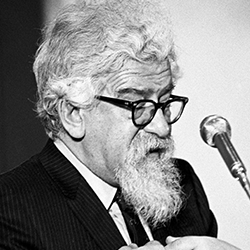
Rabbi Abraham Joshua Heschel (1907-1972)
Born in Warsaw, Poland, Rabbi Abraham Joshua Heschel was one of the most impactful Jewish theologians of the 20th century. A professor of Jewish mysticism at the Jewish Theological Seminary of America, he authored a number of widely read books on Jewish philosophy and was a leader in the civil rights movement. Heschel arrived in America in 1940, leaving behind family members who ended up being murdered in the Holocaust.
Heschel believed that the teachings of the Hebrew prophets were a clarion call for social action in the United States and, inspired by this belief, he worked for African American civil rights and spoke out against the Vietnam War. Heschel marched alongside Martin Luther King Jr. in the third Selma to Montgomery march. He famously observed afterwards, “my feet were praying.” Martin Luther King called Heschel “a truly great prophet.”
Heschel’s most influential works include Man Is Not Alone, God in Search of Man, The Sabbath, and The Prophets. At the Second Vatican Council, as a representative of American Jews, Heschel persuaded the Catholic Church to end nearly two millennia of hostility against Jews and Judaism.
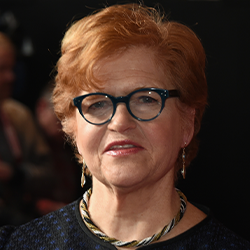
Deborah Lipstadt (1947-)
Deborah Lipstadt is an ambassador, university professor, historian, lecturer, and author. Since May 2022, Lipstadt has served as the United States Special Envoy for Monitoring and Combating Antisemitism. Her most prominent publications include Denying the Holocaust, The Eichmann Trial, and Antisemitism: Here and Now. She is an outspoken critic of antisemitism and has coined the phrase “soft-core denial” of the Holocaust.
Lipstadt is most famous for the libel suit brought against her in an English court by Holocaust denier David Irving which she won. In 2016, her book about the trial, History on Trial: My Day in Court with a Holocaust Denier, was made into a major motion picture called “Denial.”
Lipstadt has received many awards, including two National Jewish Book Awards, for her work combating antisemitism and educating about the Holocaust.
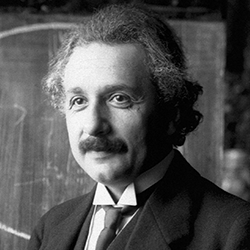
Albert Einstein (1879-1955)
Born in Ulm, Germany, Einstein was a theoretical physicist widely acknowledged to be one of the greatest and most influential physicists of all time. Einstein was on a trip to the United States in 1933 when Hitler came to power. He realized he could not return to his life in Germany, and ultimately emigrated to the United States, becoming a citizen in 1940.
Einstein spent over two decades as a professor at Princeton University and is best known for developing the theory of relativity, but he also made important contributions to the development of the theory of quantum mechanics. His mass–energy equivalence formula E = mc2, which arises from relativity theory, has been dubbed “the world's most famous equation.” His work is also known for its influence on the philosophy of science. He received the 1921 Nobel Prize in Physics “for his services to theoretical physics.”
Highly respected throughout the Jewish world, Einstein helped to found the Hebrew University of Jerusalem in 1925. In 1952, Israeli Prime Minister David Ben Gurion offered him the ceremonial role of President of Israel, a role that Einstein turned down.
Einstein's intellectual achievements and originality have resulted in “Einstein” becoming synonymous with “genius.”
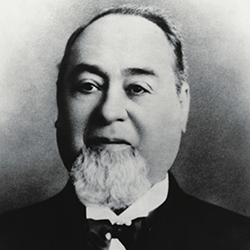
Levi Strauss (1829-1902)
Levi Strauss invented blue jeans! Born in Germany, Strauss emigrated to America in 1847 with his mother and sisters, initially working as an itinerant peddler and eventually opening a wholesale dry goods business in San Francisco that he named Levi Strauss & Co. An active member of the Jewish community, Strauss helped establish Congregation Emanu-El, the first synagogue in San Francisco
One of Strauss’ customers, another European Jewish immigrant named Jacob Davis, invented riveted denim pants and went into business with Strauss to manufacture them in 1871. The pants were a hit among workers who needed durable work attire, and in 1873 Levi Strauss patented them, starting an enduring fashion empire. The legendary jeans he helped create, known as Levi's, only grew in popularity and remain a fashion staple today.
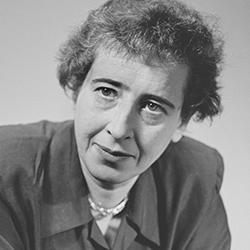
Hannah Arendt (1906-1975)
Hannah Arendt is widely considered to be one of the most influential political theorists of the 20th century. Born in Germany, Arendt was a young adult when the Nazi regime took power in 1933. She was briefly arrested by the Gestapo for conducting research into antisemitism and fled the country. While living temporarily in Paris, Arendt worked for the Youth Aliyah, helping children escape Europe to Mandatory Palestine. Arendt was stripped of her German citizenship in 1937 and ultimately made her way to America, becoming a citizen in 1950.
Arendt’s work dealt with the nature of power and evil, as well as politics, authority, and totalitarianism. She is best remembered for her book Eichmann in Jerusalem about the 1961 trial of Nazi war criminal Adolf Eichmann, her attempt to explain how ordinary people become actors in totalitarian systems and for the phrase “the banality of evil.”
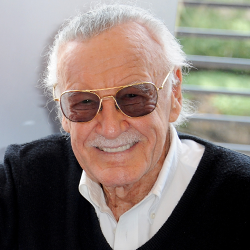
Stan Lee (1922-2018)
Born Stanley Lieber to Eastern European Jewish immigrant parents in New York, Stan Lee was an American comic book writer, editor, publisher, and producer. He rose through the ranks of a family-run business which would later become Marvel Comics. He led its expansion to a multimedia corporation that dominated the comics and film industries.
Lee created superheroes with flawed humanity, a change from the idealized archetypes that were typical superheroes at the time. His work fundamentally changed the way in which comic books engaged their readership and built a sense of community between fans and creators.
He co-created iconic characters, such as Spider-Man, Captain America, the X-Men, Iron Man, Thor, the Hulk, and the Ant-Man.
Lee is the highest grossing person in film of all time and was inducted into the comic book industry’s Will Eisner Award Hall of Fame in 1994 and the Jack Kirby Hall of Fame in 1995. He received the NEA’s National Medal of Arts in 2008.
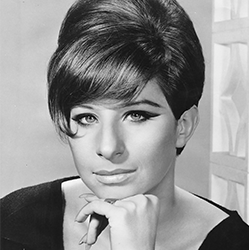
Barbra Streisand (1942-)
Born in Brooklyn, New York to first generation Jewish Americans, Streisand is one of the most beloved singers and performers in American history.
Streisand has achieved success in multiple fields of entertainment and is among the few performers awarded an Emmy, Grammy, Oscar, and Tony (EGOT). Throughout her recording career, Streisand has topped the US Billboard 200 chart with 11 albums—a record for a woman—including People (1964), The Way We Were (1974), Guilty (1980), and The Broadway Album (1985). She also achieved five number-one singles on the US Billboard Hot 100.
Streisand won an Academy Award for Best Actress for her starring role in the movie Funny Girl (1968) and is well-known for her performance opposite Robert Redford in The Way We Were (1973). She won a second Academy Award for writing the love theme from A Star Is Born (1976), the first woman to be honored as a composer at the Oscars. WithYentl (1983), Streisand became the first woman to write, produce, direct, and star in a major studio film. The film won an Oscar for Best Original Score and a Golden Globe for Best Motion Picture Musical. Streisand also received the Golden Globe Award for Best Director, becoming the first (and for 37 years, the only) woman to win that award.
Streisand is one of the best-selling recording artists of all time and is widely thought of as being one of the best actresses and singers in American history. Streisand’s Jewishness is central to her identity. She has spoken of being “proud” to be Jewish, and described herself as “a Jewess through and through…”
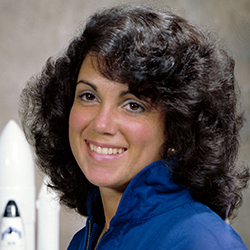
Judith Resnik (1949-1986)
Born in Akron, Ohio, Resnik grew up in a Jewishly-observant home. She had a bat mitzvah long before it was common for girls to do so. A highly accomplished student, Resnik became an electrical engineer, software engineer, biomedical engineer, and pilot.
She was the fourth woman, the second American woman, and the first Jewish woman of any nationality to fly in space, logging 145 hours in orbit. She was also the sixteenth woman in the history of the United States to attain a perfect score on the SAT exam.
At age 28, Resnik was selected by NASA as a mission specialist. She was part of NASA Astronaut Group 8, the first group to include women. She developed software and operating procedures for NASA missions. Her first space flight was in August 1984.
Her second Shuttle mission was in January 1986 aboard the Challenger. She died when it broke up shortly after liftoff and crashed into the ocean. Resnik was posthumously awarded the Congressional Space Medal of Honor.
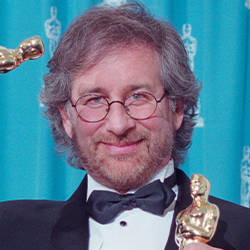
Steven Spielberg (1946-)
Born in Cincinnati, Ohio to first generation American Jewish parents, Spielberg is the most commercially successful film director of all time, a writer, and a producer. He was awarded the Presidential Medal of Freedom in 2015, three Academy Awards, two BAFTA Awards, and four Directors Guild of America Awards, as well as the AFI Life Achievement Award in 1995, the Kennedy Center Honor in 2006, the Cecil B. DeMille Award in 2009.
Seven of his films have been inducted into the National Film Registry by the Library of Congress as “culturally, historically or aesthetically significant.” He directed huge box office successes such as Close Encounters of the Third Kind (1977), E.T. the Extra-Terrestrial (1982) and the Indiana Jones original trilogy (1981–89). All these films were among the top ten highest-grossing films of the 1970s and 1980s, with Jaws and E.T. the Extra-Terrestrial the highest-grossing film ever at the time of their respective releases.
In 1993, Spielberg directed back-to-back box office hits with the science fiction thriller Jurassic Park, the highest-grossing film ever at the time, and the Holocaust drama Schindler's List, which won seven Academy Awards and has often been listed as one of the greatest films ever made. He won the Academy Award for Best Director for the latter and for the 1998 World War II epic Saving Private Ryan. Overall, his films have won a staggering 35 Academy Awards.
Spielberg used a portion of the profits from Schindler’s List to form the Shoah Foundation, a not-for-profit organization that records and archives the testimony of Holocaust survivors.
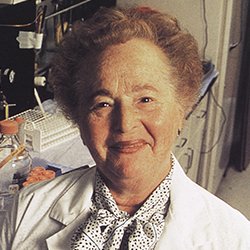
Gertrude Elion (1918-1999)
Born in New York City to Jewish immigrants from Eastern Europe, Gertrude Elion was an American biochemist and pharmacologist, who shared the 1988 Nobel Prize in Physiology or Medicine with George H. Hitchings and Sir James Black for their use of innovative methods to develop new drugs.
Her work led to the creation of the antiretroviral drug AZT, which was the first drug widely used against AIDS. Elion’s works also include the development of the first immunosuppressive drug, azathioprine, used to fight rejection in organ transplants, and the first successful antiviral drug, acyclovir (ACV), used in the treatment of herpes infection.
Unable to find a paying research job after graduating college because she was female, Elion worked as a secretary and high school teacher before working in an unpaid position at a chemistry lab. Elion saved to attend New York University and she earned her M.Sc. in 1941, while working as a high school teacher during the day.
After receiving the Nobel Prize, she stated that she believed the sole reason she was able to further her education as a young female was because she was able to attend Hunter College for free. She continued to make important scientific contributions after her retirement. One of her passions during this time was encouraging other women to pursue a career in science.
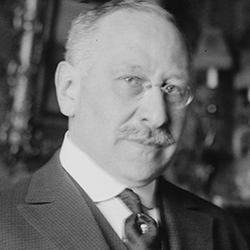
Julius Rosenwald (1862-1932)
Born in Springfield, Illinois, to Jewish German immigrant parents, Julius Rosenwald began his career as a clothing manufacturer, a field that took off after the Civil War. He ended up becoming the highly successful and wealthy part-owner and head of Sears, Roebuck & Co. He used his wealth to establish the Rosenwald Fund which had a mission to support “the well-being of mankind.” The fund supported public education, Jewish charities, and African American institutions.
Rosenwald was very active in fighting for the advancement of African Americans. In 1919 he was appointed to the Chicago Commission on Race Relations. He was a member of the board of directors of the Tuskegee Institute from 1912 until his death and endowed the institute to release Booker T. Washington from fundraising, enabling him to devote more time managing the institute. Rosenwald also provided funds to build six small schools in rural Alabama, which were constructed and opened in 1913 and 1914, and overseen by Tuskegee.
Rosenwald felt a unique responsibility as a Jew to combat racial prejudice. As he said, “the horrors that are due to race prejudice come home to the Jew more forcefully than to others of the white race, on account of the centuries of persecution which they have suffered and still suffer.”
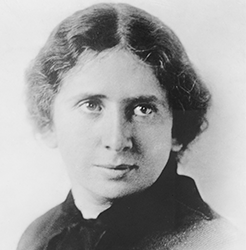
Rose Schneiderman (1882-1972)
Born in the Russian Pale of Settlement to a religious Jewish family, Rose and her family, like millions of other Eastern European Jews of the time, migrated to New York City in 1890. Her father died two years later, leaving the family impoverished and Schneiderman was forced to leave school after 6th grade to work.
Schneiderman became a leading labor union activist, an active participant in the Uprising of the 20,000, the massive strike of shirtwaist workers in New York City led by the International Ladies’ Garment Workers’ Union in 1909. She also fought for safer working conditions in the wake of the deadly Triangle Shirtwaist Factory Fire of 1911 and held top leadership positions in the most impactful labor unions. A staunch feminist, Schneiderman was also active in the women’s suffrage movement, expanding it to include working class women, and helping to pass the New York state referendum of 1917 that gave women the right to vote.
In 1933, she was the only woman to be appointed on the National Recovery Administration's Labor Advisory Board by President Roosevelt, and became a member of Roosevelt’s “brain trust.” From 1937 to 1944 she was secretary of labor for New York State, and campaigned for the extension of social security to domestic workers and for equal pay for female workers.
Schneiderman is credited with coining one of the most memorable phrases of the women’s labor movement of her era: “Bread and Roses.” The phrase referred to her firm belief that workers had the right to have more than just enough food to eat, but also to have beauty and joy in their lives.
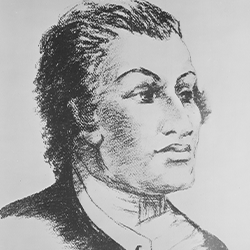
Haym Salomon (1740-1785)
Born in Poland to a Sephardic Jewish family that descended from Jews who were expelled from Spain by King Ferdinand and Queen Isabella in 1492, Salomon became a financier and emigrated to America in 1775. He became the prime financier of the rebel American side during the American Revolutionary War against Great Britain.
Shortly after arriving in America, Salomon joined the New York branch of the Sons of Liberty. In September 1776, he was arrested as a spy. The British pardoned him, but detained him for 18 months on a British boat as an interpreter for Hessian soldiers, German troops employed by the British. Salomon used his position to help prisoners of war from the Continental Army escape, encouraged the Hessians to desert the war effort, and carried out other espionage activities.
From 1781–1784, Salomon’s fundraising and personal lending helped provide over $650,000 (approximately $14.3 million in 2023 dollars) in financing to General George Washington in his war effort. Salomon converted French loans into ready cash, brokered large donations, and, most remarkably, donated his entire personal fortune to the American Revolutionary army and various Founding Fathers of the United States of America. Most meaningfully, Salomon is believed to have granted outright bequests to men that he thought were unsung heroes of the revolution who had become impoverished during the war.
Salomon was an active advocate for Jewish rights in the nascent United States, and had an important role in the 1783 overturning of Pennsylvania’s constitutional provision that one declare their adherence to Christianity in order to hold state office. In 1784, responding to antisemitic slander in the press, Salomon stated, "I am a Jew; it is my own nation; I do not despair that we shall obtain every other privilege that we aspire to enjoy along with our fellow-citizens."
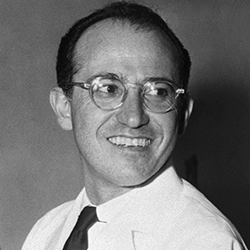
Jonas Salk (1914-1995)
Jonas Edward Salk was born in New York City to Russian-Jewish immigrants. The first member of his family to attend college, he earned his medical degree from the New York University School of Medicine in 1939 and became a scientist physician at Mount Sinai Hospital.
In 1947, Salk was appointed director of the Virus Research Laboratory at the University of Pittsburgh School of Medicine.While working there, with the National Foundation for Infantile Paralysis, Salk saw an opportunity to develop a vaccine against polio, and devoted himself to this work for the next eight years.
In 1955, Salk’s years of research paid off. Human trials of the polio vaccine effectively protected the subject from the polio virus. When news of the discovery was made public on April 12, 1955, Salk was hailed as a miracle worker. He further endeared himself to the public by refusing to patent the vaccine. He had no desire to profit personally from the discovery, but merely wished to see the vaccine disseminated as widely as possible.
Dr. Salk’s last years were spent searching for a vaccine against AIDS.

Aly Raisman (1994-)
Born in 1994, Aly Raisman is now a retired American artistic gymnast and two-time Olympian. She was captain of both the 2012 “Fierce Five” and 2016 “Final Five” U.S. women’s Olympic gymnastics teams, which won their respective team competitions. She is the third-most decorated American gymnast in Olympic history with six Olympic medals.
Forty years after the 1972 Summer Olympics in Munich where Palestinian terrorists stormed the Olympic Village apartment of the Israeli athletes, killing two and taking nine others hostage, Aly Raisman honored the slain Israeli athletes by competing in the floor exercise to the melody of “Hava Nagilah,” an event in which she won gold.
“The fact it was on the 40th anniversary is special, and winning the gold means a lot to me,” said Raisman, who then accepted an invitation from Israel Diaspora Affairs Minister Yuli Edelstein to make her first visit to Israel along with her family.
Raisman has always displayed immense pride about her Jewish identity: “I take a lot of pride in being able to not only represent the U.S.A, but also the Jewish community everywhere.”
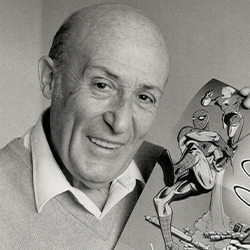
Will EIsner (1917-2005)
Born in Brooklyn, New York, Will Eisner was an American comic book artist and writer of Austrian-Jewish and Romanian-Jewish descent.
Will Eisner is widely considered the father of the American graphic novel. When Eisner began his work, comics were looked down on by those who worried about what young people were reading. By the 2000s, however, Eisner was widely appreciated as the man who elevated comic book methods to respect in the form of the graphic novel.
In a career that spanned seven decades, Eisner pioneered many of the techniques that became widespread during the graphic novel boom that began in the 1990s.
In 1978, he published what is considered the first graphic novel, A Contract with God, and Other Tenement Stories. From 1978 until his death in 2005, Eisner's experiments with the graphic novel form gained him the admiration of comics artists around the world.
Eisner's impact on the comics community is so great that the leading award given to graphic novels is called the Eisner Award. The Will Eisner Award Hall of Fame was also named after him.

Sandy Koufax (1935-)
Born in Brooklyn, Koufax showed an early talent for sports, playing basketball and baseball in both high school and college. A highly talented pitcher, Koufax was signed by the Brooklyn Dodgers before finishing college with a then-huge signing bonus of $14,000.
Koufax became one of the best pitchers in baseball history, becoming the eighth player overall to pitch a perfect game.
In the 1965 World Series, Game 1 was scheduled for Yom Kippur, and Koufax declined to pitch so he could observe the holiday. His decision was covered in the national news, and he became a symbol of great pride for American Jews who wanted to be able to retain their Jewish identities while still being fully American.





